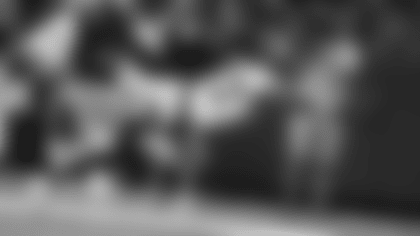Q. In your postgame remarks following the preseason opener against Houston, you used words like sloppy and disappointing, you referred to a couple of aspects of the team's performance as "JV." Because that was a preseason game, and the first one at that, was that performance a better outcome than a well-executed win, since it provided so many teaching tools for your final days in Latrobe?
A. Time will tell that story. Results like that get people's attention, and attention is good, particularly in terms of development at this time of year. But you never want to play like that. You know, that's putting a positive spin on a negative outcome. You just don't want to play like that. You like to eliminate problems before they happen, because to me that's high level coaching and playing. Adequate coaching and playing is making problems disappear quickly, and so I'm excited about us getting an opportunity to bounce back from some of those things, some of those self-inflicted wounds. Because it's an important component of development, you can't begin to talk about beating other people until you stop beating yourself. And so we did some things in that game that are just not characteristic of sound ball. Getting under punts or not getting under punts. We were highly penalized in some instances, center-quarterback exchanges, some pre-snap penalties, junior varsity football.
Q. What was your tone with the team in the video review of that performance?
A. It was appropriate. The film review is a significant component of the get-better cycle. We play, then we analyze that play on video, and through that analysis we chart a course for our next opportunity. Whether it's how we divide up the labor, who gets what opportunities and how much, or the things that we do, or the things that we focus on in drill work from a prep standpoint, the physical prep. And so the film session is a major component of it. It really starts the process of readying yourself for the next task. And so we had some significant meetings in that regard.
Q. So is anger ever anything you use, and is it an asset when you do?
A. If it's real, I do. Because I just think it's important that we be authentic and transparent, and so absolutely. Some things on that tape made you angry. Some things on that tape are just challenges, coaching challenges, playing challenges, as we work continually to get better.
Q. One of the issues you had with the Texans game was the team's performance on possession downs, and you talked specifically about winnable possessions downs on defense. Is there a measurement for what a winnable possession down is for the defense?
A. The longer the distance, the more winnable it is. I think we lost a third-and-9 in that game, and a third-and-8. We had a third-and-16 where they got 15 yards. Those are very winnable downs. The greater the distance, the more winnable the down is for the defense. Just like short yardage is an offensive favorite circumstance.
Q. Down the stretch of the 2023 season when your team went on a three-game winning streak at the end of the regular season to earn a playoff berth, you often used the phrase, "scared money doesn't make money." What does that mean?
A. It means we're not going to get tight in the most critical moments, we're not going to take the calculated risk in pursuit of greatness. We're not going to squeeze the golf club too tight, in a golf analogy. I just always want guys to know when you're chasing scarcity, when you're trying to be great, there is calculated risk associated with that. We've got to understand that. We've got to be bold in our pursuit of what it is we're after.
Q. In a lot of instances, calculated risks on offense might mean flirting with turnovers. Is it ever an acceptable way of looking at it in your mind to say turnovers are just a part of doing business?
A. Sure. That's what I mean. The calculated risk-taking, the pursuit of chunks throwing the ball down the grass. There's risk when you throw the ball down the grass. There's protection risk. There is ball risk down the field. And so certainly, the more aggressive you are, that opens you up for potential negativity, not that you accept negativity, but it is an acknowledgement of its existence, certainly.
Q. We have talked about what September football is in the NFL and what it takes to win in the NFL in September. Is taking calculated risks the wise thing to do in September football in the NFL?
A. It depends on individual and unit development. It depends on who we're talking about, their level of experience, their floor, if you will, as individuals. And the same thing with units. Sometimes you have great continuity in a unit that allows you to mature at a faster rate. As we prepare for Buffalo, for example, Buffalo is going through some changes in the interior portions of their secondary. They used to have Jordan Poyer and Micah Hyde and Taron Johnson and Matt Milano and Tremaine Edmonds in that second- and third-level interior. Those guys played together for about four or five years. And so their September readiness was a little bit different than maybe the September readiness of this group that they now have, because they don't have Edmonds, Milano, Poyer, and Hyde. The only guy they got left in the interior portions of that collective is Johnson.
Q. You said Russell Wilson will start at quarterback in tonight's game against Buffalo. But when it comes to that job for the regular season opener, how would you describe the situation with Wilson and Justin Fields as we sit here today?
A. It's probably in the same place that I've described it throughout the spring and the summer. Both guys are vying for the role. Russ has pole position because of the collective body of work, the totality of the body of work that he brings into the circumstance. Both guys are new to us. We're getting an opportunity to get to know them through this process. It's been a great process. Now that Russ has full health, it's going to heat up over the next couple of weeks, and I'm excited about watching it happen.
Q. When do you have to make a decision on a starting quarterback?
A. Before the opener.
Q. But don't you want to have that decision made as the week of practice for the opener starts?
A. Certainly. I think decisions along these lines need to happen when there's clarity, and preferably you like clarity sooner rather than later. But I won't make the wrong decision for the essence of time. Clarity is what we seek, but we've got two significant weeks left in this process in terms of in-stadium performances and so forth. And I think these things have a way of playing themselves out.
Q. How do you handle that decision with the team? Is there an announcement?
A. There is. But if it's done right, I don't know how earth-shattering that announcement is. People watch play just like I watch play. If it's fair, and guys are given an opportunity to show what they're capable of, I think very rarely is it the aftershock that people on the outside think it may be. When you're working every day and you're watching it, very rarely are you surprised by the decision making.
Q. In terms of body type, skill-set, demeanor, what are you looking for in a gunner on the punt team?
A. A guy who's not scared to squeeze the trigger. Those are challenging circumstances – open grass tackles while running at full speed and fending off one or two blockers. And so for me, I think the common characteristic that all top-flight gunners have is at that point of confrontation down the grass, they squeeze the trigger. They take their shot. Hesitating, second-guessing at that point is generally negative, but things are happening fast, and it's a challenge.
Q. What about the offensive or defensive position the gunner might play?
A. I think speed is the major component, because of the long grass in the play. I've seen wild things over the years, unique body types out there, linebackers. I remember Lawrence Timmons as a rookie was a gunner. I've seen wide receivers, safeties, corners. Gunners come in various shapes and sizes, but speed is the common denominator. The long grass component makes speed a prerequisite.
Q. To my untrained eye, Miles Boykin was a good gunner. Is that accurate?
A. No doubt.
Q. OK, he was a receiver, not particularly fast in that he wouldn't win many races. What made him a good gunner?
A. He had receiving skills that allowed him to get releases at the line of scrimmage. And then he had long arms that kept people off his body, and so he covered the grass. You know, his receiving talents, his ability to get off the line, was an asset to him. You might have a defensive back who might be faster than Miles Boykin, but what are his release-game skills like? The receiver component was an asset to Miles as a releaser, and then his length kept people off his body as he negotiated down the grass. And that was the thing that allowed him to cover the distances.
Q. A couple of the camp-closing activities on campus are the Home Run Derby and the Rookie Show. Are those just things that are fun and break up the routine, or do they have some value?
A. They're fun, and they do break up the routine, but we buy into the ceremonial things that are team-building. That's why we take our team to Kennywood, or Dave & Buster's and outings like that. Topgolf. I just think informal time spent together, there's value in that. Football is the ultimate team game. Guys gaining an understanding regarding one another, respecting one another's various backgrounds and approaches, I just think there's collective growth in that. Good teams capture that which you cannot measure, and we pay respect to it by organizing some non-football things to kind of stimulate that growth.
Q. You have mentioned "capture what we cannot measure" several times, and you're referring to after-hours team-building. You also praised your group for an earnest effort made by the players to take advantage of that. How do they do that?
A. By giving their time and space and experience. And particularly the older players. They give more than they receive in those informal interactions, but it is necessary for the growth and development of our young people. And so it's cool to watch Russell Wilson sit at a picnic table and play Connect 4 with younger guys and share his wealth of knowledge and experiences that he's had in this league, for example. Those are some of the things that you see when you create an environment where that happens.
Q. Because the rest of the coaches and all the staff live in Benedict Hall on the Saint Vincent College campus, you are the only one living in Rooney Hall with the players. Do you see your presence there as the prefect of discipline, or is it some sort of softer, more gentle purpose, maybe as a mentor?
A. No, let's be really clear. There's a discipline angle there. I'm in the middle of the dorm on the second floor, right when you get off the elevator, centrally located. I see and hear everything that goes on in that building.














